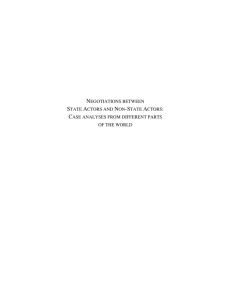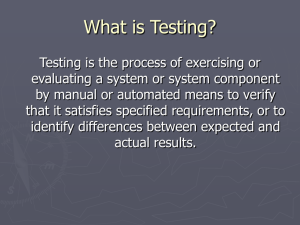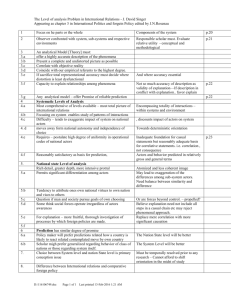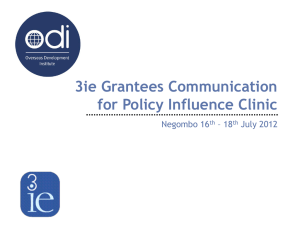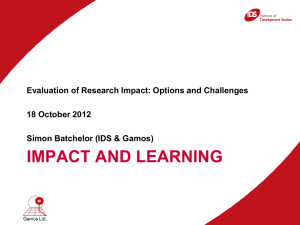Private Education in the Context of Development
advertisement
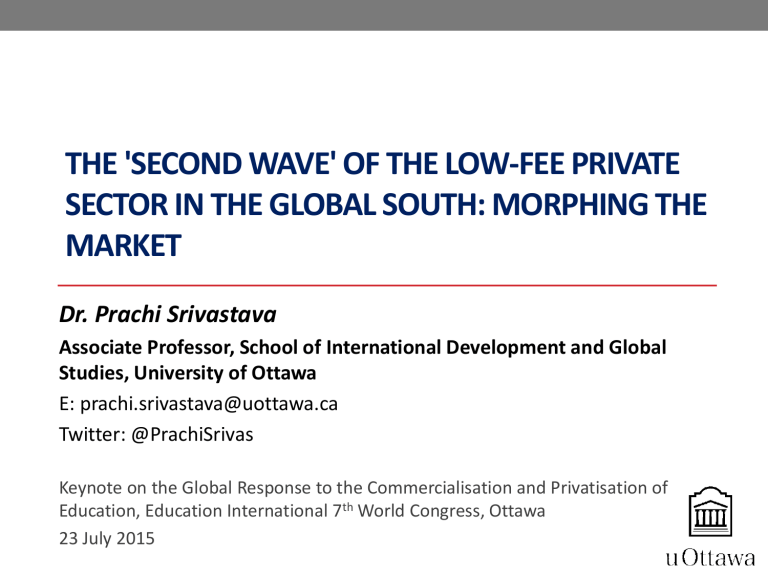
THE 'SECOND WAVE' OF THE LOW-FEE PRIVATE SECTOR IN THE GLOBAL SOUTH: MORPHING THE MARKET Dr. Prachi Srivastava Associate Professor, School of International Development and Global Studies, University of Ottawa E: prachi.srivastava@uottawa.ca Twitter: @PrachiSrivas Keynote on the Global Response to the Commercialisation and Privatisation of Education, Education International 7th World Congress, Ottawa 23 July 2015 Pearson’s Affordable Learning Fund Gets $50M Injection Private Sector, RTE and ‘Abusive’ Practices United Nations Special Rapporteur on the Right to Education 86. The commercialization of education and its uncontrolled liberalization, open to all operators for lucrative purposes or objectives, are contrary to international commitments by States and national values and must be stopped and sanctioned.” 89. By definition, business is profit-oriented. Education is all the more attractive since it denotes a certain respectability, which can be projected to disguise business interests, fraudulent practices and corruption […] 90. As regulators, States must sanction abusive practices by private education establishments (United Nations, 2014) Levelling the Playing Field? The ‘Second Wave’ of the LFP Sector • Shift from one-off mom-and-pop ‘teaching shops’ to existence with corporate-backed low-fee private school chains • Different from ‘chains’ of the past (cross-subsidisation) • Shift from micro-ecosystems (e.g. individual villages, slum communities, and urban neighbourhoods) to a micro-system within themselves, across geographical boundaries beyond the local (e.g. across districts, cities, and countries) The ‘Second Wave’ of the LFP Sector (2) • Entry of ‘big’ corporate capital • Ecosystem of allied service providers (e.g. education microfinance institutions; rating systems; scripted curriculum delivery systems; education technology providers (low- and high-tech), etc.) • Markers of ‘institutional evolution’ (DiMaggio & Powell, 1983) of the sector Two Intertwining Trends 1. Mobilizing discourse and filtering evidence — in particular, morphing the metaphor of the market to illogical consequence 2. The opening up of domestic formal education spaces through state-sanctioned public-private partnership (PPP) arrangements, and framing mental models accepting of the discourse of ‘partnership’ 3. Increasingly opaque, intertwined, and complex sets of ‘new/non-traditional’ non-state private actors operating in education in the Global South, with direct or arm’s length corporate connections that operate by blurring the lines between ‘doing business’, profit-making, and ‘doing good’ (Olmedo, 2013) Caveats 1. Questioning claims of ‘scale’: total numbers miniscule as a proportion of state provision 2. Strategic locations of operation: political stability and economic growth 3. Act of ‘doing good’ different from traditional grant- making philanthropies in the ‘business of charity’ -‘Type-P’ actors operate with the mental models or the actual modalities of the ‘business of making money’ with an added offshoot of ‘doing good’ The Three Muskateers: branding, competition, and profit • James Tooley: ‘school chains with names such as EasyLearn or Virgin Opportunity could be as reliable as, say, Sainsbury’s or Boots’ (Wilby, 2013) • Bridge International: ‘Starbucks’ of schools • Replication and standardisation • ‘Assisting the market in the creation of educational brand names…is another possible area for outside action—for philanthropy, investment, and aid if required to satisfy investors of the viability of the market’ (Tooley, 2009, p. 260). • ‘competition would be a chief spur’ (Tooley, 2009, p. 261). Unbranded or unchained schools ‘could suffer or go out of business’ Perversion of metaphor of the market • Two peculiarities of education as a good: complications of treating markets as pure competitive (Friedman, 1962) • ‘Neighbourhood effects’: ‘Circumstances under which the action of one individual imposes significant costs on other individuals for which it is not feasible to…compensate…or yields significant gains to other individuals…[to] compensate him [/her]’. • Effects beyond the individual; school closures? • ‘Paternalistic concern for children and other irresponsible individuals’: need for the state to be involved where schooling may not be universal, compulsory and enforcing that compulsion to RTE Scaling Up: Tacit ‘Partnerships’ and Privatisation • Privatization by design not default • Discourse of Partnership: ‘partnership’ is as ‘ubiquitous as community, evoking much the same warm mutuality’ (Cornwall, 2007, p. 475), but it is precisely its ubiquity that renders partnership ‘a floating empty signifier’ (Burgos, 2004). • Modalities of Action PPPs: Uganda, India, Pakistan ‘It’s absolutely for profit. But get this right—it’s important to demonstrate profit because we want other investors to come in’ –Michael Barber, Chief Education Advisor PALF, BBC HardTalk Type-P Organisational Constellations and ‘Doing Good’ • Narrative of ‘doing good’: borrows from and attaches itself to philanthropy (notions of benevolence); organisational modalities and mental models of organisational actors stated motive to profit • Effaces distinctions: Type-P and philanthropic actors with more without regards to capital ROI • Commercialisation as a key force, and marketization as a key mechanism of action • Type-P actors alongside government, not-for-profit, and aid agencies: complex organisational constellations in formal government-enabled and informal networks potential capture by actors with commercial interests

